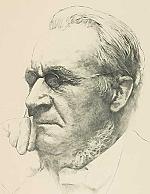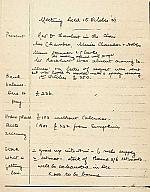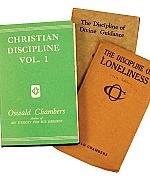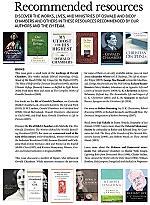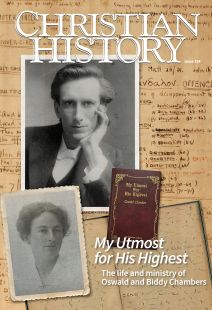My search for Oswald Chambers
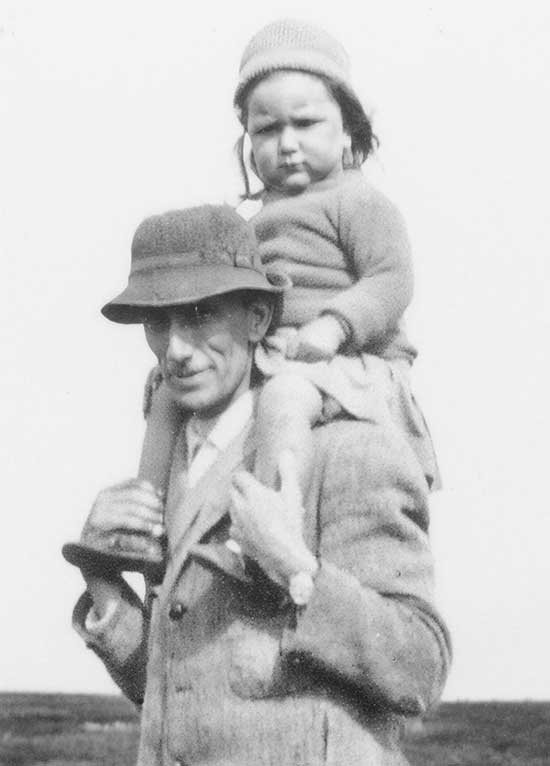
[Above: Oswald Chambers with Kathleen on his shoulders, 1914 to 1915. Askrigg, Yorkshire Dales, England—Oswald Chambers Publications Association, Ltd. / Wheaton College Archives & Special Collections]
Around 1960 I acquired a copy of My Utmost for His Highest by Oswald Chambers. Friends told me it was a challenging devotional book. As a young man of 17, wanting very much to live for Christ, I began to read the daily selections. Still, many mornings I closed the book with no understanding of what Chambers had written. I couldn’t seem to get into it.
In 1985, while I was preparing for a short-term missionary venture to Africa, My Utmost came alive. Perhaps it was my age or the circumstances. Maybe it was the afternoon a month before our departure for Africa when my wife and I were stunned by the news that she was pregnant. Suddenly life felt out of control, and Oswald Chambers seemed to be reading my mail.
I felt that, many times, a sentence in My Utmost was written just for me: “There is no condition of life in which we cannot abide in Jesus” (June 12). “God gives us the vision, then He takes us down to the valley to batter us into the shape of the vision, and it is in the valley that so many of us faint and give way” (July 6).
My Utmost became for me what it has been for countless other Christians: a major source of encouragement and guidance for living life in the Spirit.
A NEEDLE IN A HAYSTACK
Chambers’s writing birthed in me a curiosity about the man himself. From where did his wisdom and insight spring? What circumstances molded such a man? I learned the outline of Chambers’s life from Oswald Chambers: His Life and Work. But for all its rich insight and detail, the book left me wondering about key areas.
There wasn’t much information available on Chambers. His diaries had disappeared, and only three or four of his letters remained. He had been dead for nearly 75 years, and everyone who knew him was probably gone as well. When the Oswald Chambers Publications Association invited me to make a survey trip to Britain, it seemed like a needle-in-a-haystack situation.
In September 1991 I traveled to England and met Kathleen Chambers. She was gracious while retaining a healthy skepticism about a new book. I didn’t blame her. Visits to the British Library and Cambridge University library yielded nothing. Apparently no one had ever written a thesis, dissertation, or even a scholarly paper about Chambers.
A Sunday afternoon in London’s Imperial War Museum gave me glimpses of World War I from the British perspective. Out of curiosity I returned later in the week to visit the museum’s library and archives. After sifting through a hundred index cards, I requested a small personal memoir of a soldier who had an association with the YMCA in Egypt. On page 10 I was dumbfounded to find an arrow pointing to a photograph of Oswald Chambers and an account of how Chambers had brought this soldier to a personal faith in Christ.
I gave the loudest inner shout possible in the dignified silence of the reading room and thanked God. In one of the biggest archival haystacks in Britain, he had given me a needle.
That was the first of many “haphazard” discoveries that I believe were engineered by the Holy Spirit. Each one involved finding key material that I didn’t know existed. One afternoon in London, Kathleen Chambers casually told me, “There’s a woman still alive who would have known my father. Her name is Dorothy Docking, and she lives in Santa Barbara, California. Here’s her address.”
I couldn’t believe it. On a beautiful Sunday in April, Dorothy Docking, 92 years old and brimming with enthusiasm, welcomed me to her apartment. We talked for nearly two hours.
“Oh yes,” she beamed, “from the time I was eight until he went off to the First World War when I was 15, Oswald Chambers spent one week every year in our home in Blackpool.”
When I asked her to describe Chambers’s preaching, she smiled and said, “ I never went to any of his meetings. In fact, at first I didn’t even know he was a minister. From the day we met, he was just a friend to me; someone who asked about the things I was interested in. When he died and I found out he was nearly as old as my parents, I was staggered. He seemed eternally young.”
Chambers was also known and loved for his rollicking sense of humor. After meeting Oswald for the first time, one serious young man said, “I was shocked at what I then considered his undue levity. He was the most irreverent Reverend I had ever met!”
“APOSTLE OF THE HAPHAZARD”
The man I discovered transcended narrow theological or denominational niches. He could speak relevantly to a group of Christian workers, for instance, warning them,
Dealing with souls is tenfold more dangerous than dealing with bodies. Unless you are in a healthy, vigorous condition with God, you will catch the disease of the soul you are dealing with instead of helping to cure it.
Or he could talk gently to war-sick soldiers evacuated from the murderous Gallipoli Campaign. On March 3, 1917, Chambers wrote in his Egypt diary:
Yesterday in introducing me to a missionary from India, Mr. Swan called me “the apostle of the haphazard,” . . . God’s order does seem to me to come in the haphazard, and we partake of His order as we discern Him in the common “bread and wine” of ordinary experience.
At the time, he had no idea that his own life would end suddenly in a few months. Nor could he know the extent to which God would exponentially increase the scope of his spoken words after his death. Chambers once said: “Many of us are serving our own ends and Jesus Christ cannot help Himself to our lives; if I am abandoned to Jesus, I have no ends of my own to serve.”
It was not his natural winsomeness or gifts, but a deeper, spiritual quality that has enabled him to speak forcefully to this century.
Who was Oswald Chambers? I found he was many things to people—artist, teacher, husband, father, friend. But above all, in solitude or service, he was someone wholly and joyfully abandoned to God.
By David C. McCasland
[Christian History originally published this article in Christian History Issue #154 in 2025]
David C. McCasland is a contributor to Our Daily Bread and the author of Oswald Chambers: Abandoned to God. This article originally appeared in Christianity Today and is adapted and reprinted with kind permission.Next articles
Recommended resources: Oswald Chambers
Discover the works, lives, and ministries of Oswald and Biddy Chambers and others in these resources recommended by our authors and the CH team.
the editors and authors



